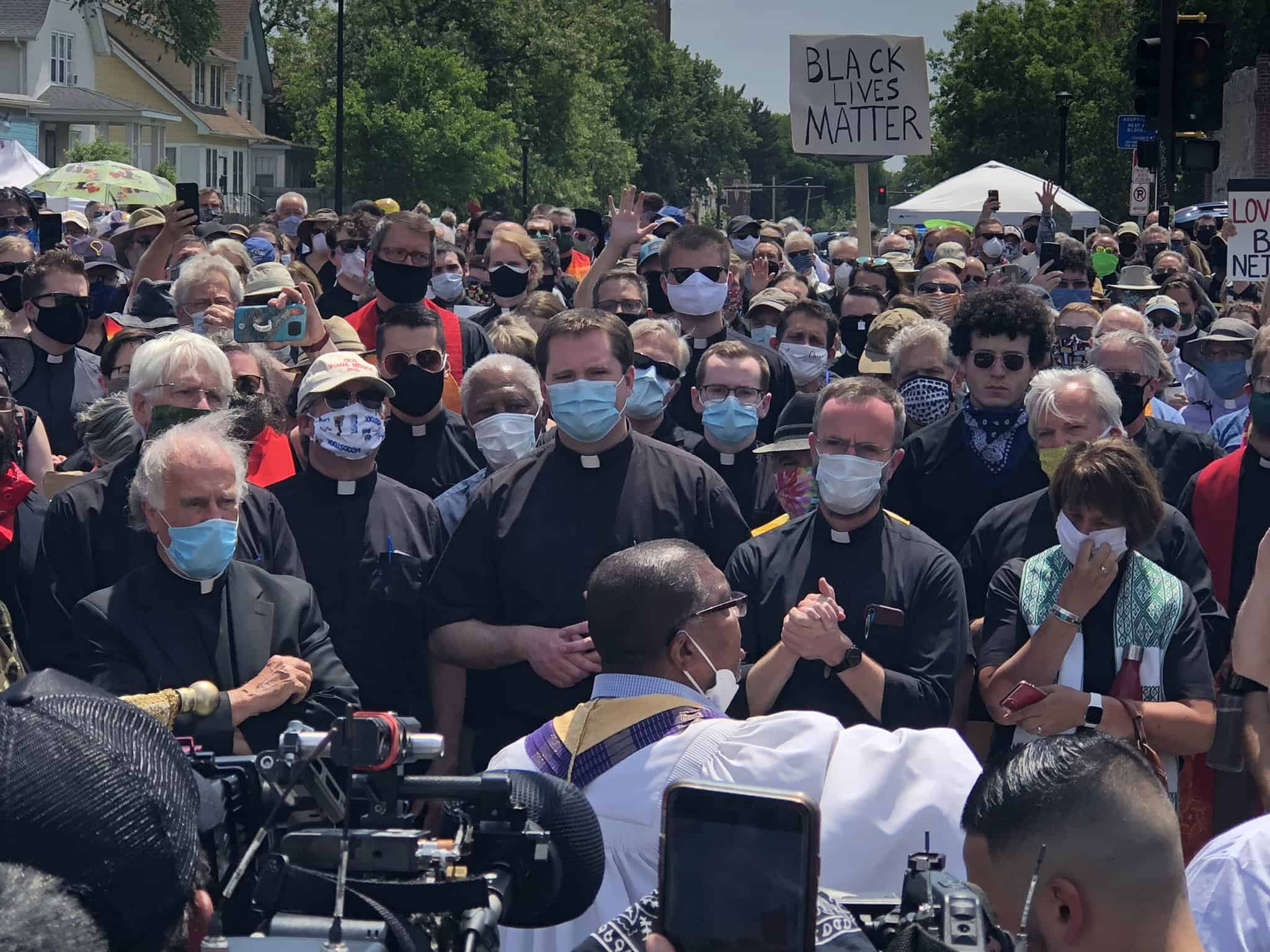“You are not far from the kingdom of God.”
These words from Christ struck me in the twelfth chapter of Mark’s Gospel one morning as I prepared to give a reflection at an upcoming prayer service. Over the weeks I’d been teaching theology to middle schoolers in Omaha, I often found my personal prayer being shaped by my work at the school.
In addition to the exhaustion that came with teaching adolescent boys, my prayer was colored by the funny comments and questions I got from my students or the banter I overheard at lunchtime. As I got to know the students better and they began to trust me more, there was a new element to my prayer. These boys shared struggles and worries that no child should have to shoulder. One of my fifth-grade students once said to me, “I just wish boys like me didn’t have to carry the things we do.”
Right before telling the scribe that he is not far from the kingdom of God, Jesus teaches the greatest commandment: first, to love and know God, and to serve him with all our hearts. Through that knowledge and through that love we are to love each other, to love our neighbors as ourselves. When we follow this, Jesus tells the scribe, “You are not far from the kingdom of God.”
Looking back on that morning, the reading was familiar to me, I had prayed with it many times. But something stirred within me, with Christ’s words weighing much heavier this time.
My sixth-grade students were the leaders for the prayer service that week. As the leaders, the class would choose a theme and then select a Gospel reading and craft prayers or poems according to the theme. The boys had decided to organize their prayer service around the theme of Black Lives Matter. This prayer service took place in February, Black History Month, but the relevance of this theme was not simply related to the date.
My students had been told: “The Catholic Church and Black Lives Matter have no business being in the same conversation.”
I imagined what might have been going through the minds of these young, Black boys as they heard this. I imagined my coworkers being told that this was the Church’s true stance on the matter.
My heart broke as I sat at my desk wrestling with all of this, I was reminded of the words of Saint Óscar Romero, who once asked, “A word of God that doesn’t touch the real sin of the society in which it is being proclaimed — what gospel is that?”
I recalled the image of my students when they chose the theme “Black Lives Matter” despite what they had been taught regarding Christianity and the movement. This theme was written on the whiteboard, surrounded by other themes such as “Brotherhood,” “Love,” and “Men for Others.” Yet when it came time to vote, with their heads down, fifteen hands came into the air: a unanimous vote.
The next day, I walked around the class to help my students craft their prayers and poems for the service. One boy’s poem began with the words, “I am Black and know my God loves me. I am Black but wonder, do my neighbors love me?”
I knew that if I were truly to preach the gospel that week, I had to address this real sin.
—
As a man, as a Christian, and as a Jesuit, when I say that Black lives matter, I am not simply affirming the dignity and beauty that God has bestowed on my Black brothers and sisters. I am acknowledging that too often, we have failed to protect that dignity. We have failed to protect the beauty of our Black brothers and sisters.
My students held their prayer service on February 23, 2021, the first anniversary of the murder of Ahmaud Arbery. He is one in the long list of names of men who have been killed in this country simply for being Black. Ahmaud was a man on a run in his neighborhood in Georgia before being shot and killed.
Not three months later we saw the unjust death of George Floyd.
Considering all this, Christ’s words from the Gospel began to challenge me. I could not help but think and pray: What would Jesus say to us? What would Jesus say to our nation in seeing the way that we treat our Black brothers and sisters?
What would Jesus say to my students?
The cruelty and the disregard our brothers and sisters are enduring is so foreign to the peace and justice Jesus calls us to. I couldn’t help but hear Christ saying to me that as a nation, we are quite far from the kingdom of God.
—
When George Floyd died, I was in Saint Paul, Minnesota where I completed my Novitiate. Because we lived on the same street as the governor of Minnesota, protests and demonstrations frequented our neighborhood. After the murder of George Floyd there were massive amounts of people in the street and on our lawn, silently, peacefully seeking answers. They were asking the same question on the hearts of so many: Why does this continue to happen? Why are we so far from the kingdom of God?
During these days, as I sat with other novices, listening to the speeches, we were approached by two men. They were leaders of local Black churches in the Twin Cities area who informed us of their plan to organize a march. They had a vision of gathering Christians of all denominations throughout the Twin Cities to march in solidarity.
While my brothers and I immediately had the desire to participate, there was a question as to whether we would be able to. Amid the COVID surges of the summer of 2020, the safety of our community was a real concern. As we prayed with these concerns, along with our anger and our sadness at what was happening, we realized we had a privilege. We had the privilege to sit this out, to remain comfortable and sheltered from what was quite literally happening on our doorstep.
Nothing about that felt right to any of us.
The common sentiment within the house was that we couldn’t be silent in the face of injustice. We ultimately saw an opportunity to join with our Christian brothers and sisters in proclaiming that the Church has something to say in the conversation. The Church has a duty and an obligation to defend our Black brothers and sisters.
—
A few days later, we met at a church and began to organize ourselves to march. It was the Black clergy first and then us; white, Hispanic, Asian leaders and members of various churches. The organizers of the march wanted to line up this way to symbolize that we “had their backs,” that we understood their struggle and were there to support them.
We marched in prayerful, intentional silence to the intersection of Chicago Avenue and East 38th Street where George Floyd was killed. Here, along with hundreds of other people, we knelt in prayer. After a local Black member of the clergy led us in prayer, he asked us to pray the prayer that we all knew: the Lord’s Prayer.
There was a haunting beauty to look out and see hundreds of people knelt in prayer, occupying an entire intersection. I saw young children lifted onto their parents’ shoulders and the elderly being helped to their knees. Looking through the crowd, I could see people dressed in Roman collars, dashikis, kurtas, and t-shirts.
My own clerical shirt clung to my back as I sweated under the sun. Not far from me, a Byzantine priest in full cassock knelt beside a man in cargo shorts, while a black woman roughly the age of my grandmother laid prostrate on the hot pavement.
Amid this, all of us, Christians of every denomination, joined together in praying the simplest prayer that we know, the prayer that Jesus taught us.
I felt Christ present throughout it. I heard Christ telling me that this is what the kingdom of God looks like. In that moment, when we were able to truly see each other as brothers and sisters in Christ, the kingdom of God could not have been more present and alive. In the midst of our grief and despite the difference in our traditions, looking through that crowd, it seemed the Lord’s Prayer was coming to fruition: “on earth as it is in heaven.”
This is the Church I want my students to know. A Church that isn’t afraid to listen to their pain and work to defend them. I hope my students will come to know a Church that is not silent but speaks loudly in proclaiming that their lives do indeed matter.
-//-
Photo courtesy of the author.


